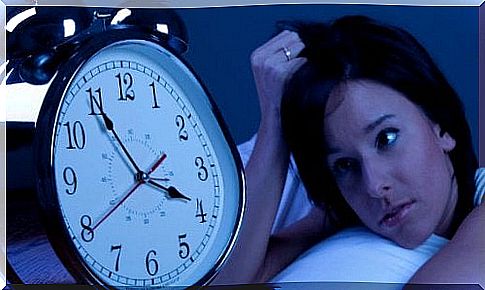Causes Of Waking Up At 3 O’clock At Night And Some Solutions

A surprisingly common phenomenon nowadays is waking up at 3 o’clock at night or even a little later than this time. Some people attribute mystical or supernatural causes to it. In reality, it is a problem related to sleep disorders or anxiety. Read on to find out what the actual causes of waking up at 3 o’clock at night are.
If you wake up frequently in the early hours of the day and fail to fall asleep again, you may end up suffering from more serious problems. For this reason, it is important to find out the causes of waking up at 3 o’clock. In addition, you need to know what you need to do to be able to rest again.
Symptoms associated with waking up at 3 o’clock at night

Numerous magazines and websites have debated this topic. In reality, it is not about any “bizarre” phenomenon. Waking up at 3 o’clock at night is simply a natural reaction of our brain in the presence of a high level of stress. But as soon as this problem begins to affect our ability to rest, we must take steps to remedy it.
Here are some symptoms often associated with waking up at 3 o’clock at night:
- You wake up feeling a state of anxiety and intense anxiety.
- You have heart palpitations and you feel a danger lurking.
- It is impossible for you to fall asleep again, and this amplifies anxiety, negative thoughts and insomnia.
- If you manage to fall asleep again, you will not have a restful sleep and you will feel very tired in the morning.
- The phenomenon is repeated several times during the week.
The connection between anxiety and waking up at 3 o’clock at night
What are the causes of waking up at 3 o’clock at night?
If during the week you happen to wake up in the early hours of the day repeatedly, the first thing you need to do is ask yourself if something in your life is worrying or bothering you. Maybe you are overworked or you are facing an emotional problem.
All the factors I have just listed can cause anxiety. But it often happens that we do not realize that we are affected by anxiety. Instead, our brain’s reaction to this problem is sleep disturbance. We will start to fall asleep hard and we will wake up in the early hours of the day with the feeling that we are in danger.
Let’s see how stress and anxiety become the causes of waking up at 3 o’clock at night:
- Anxiety directly affects the central nervous system (CNS). This causes small changes in the bio- and neurochemical systems involved in the sleep-wake cycle. All these changes will alter the sleep phases (REM and non-REM).
- In general, when we are affected by anxiety, we have difficulty falling asleep. We probably only get to sleep at midnight, but our sleep will be fragmented. In addition, it will be harder for us to enter the REM phase, when sleep becomes deep and restful. Our brain will interpret the anxiety we feel as a danger that we must move away from. Therefore, we will wake up around 3 o’clock in the morning.
- Waking up at 3 o’clock at night is a natural response of the human body to anxiety, sleep disorders occur due to altered neurotransmitters.
What can I do to fix this?

How to combat the causes of waking up at 3 o’clock at night? If you suffer from anxiety disorders caused by anxiety, you will have to deal directly with the sources of stress and the causes of anxiety. Only then will you be able to have a restful sleep.
- First, you need to accept and acknowledge that there is a problem. It is not at all normal to wake up at night full of fear, feeling that you are in terrible danger. You need to try to find the cause of this problem. What bothers you? Why are you unhappy and why do you feel threatened?
- Make small changes in your life. Reorganize your priorities and adopt new habits that will stimulate your brain and help you get rid of stress.
- Try going for a walk after dinner for at least half an hour. Walk, take a deep breath, try to look at things from a new perspective and relax.
- When you get home, take a relaxing bath before bed. Avoid useless thoughts like “I need to rest tonight to be productive at work tomorrow.” Such thoughts will simply stress you more, because you will see sleep as an obligation.
- Clear your mind and avoid disturbing thoughts.
- Make sure your bedroom is clean and well ventilated. According to several specialists, the ideal temperature to have a restful sleep is 20 ° C. If the temperature in your bedroom exceeds 25 ° C, it will be difficult for you to fall asleep.









